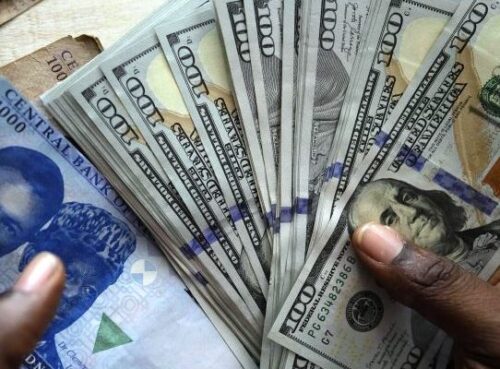
The Nigerian naira appreciated to an eight-month high of ₦1,474.78/$ at the official foreign exchange (FX) market on Friday, reflecting reduced dollar demand driven by fiscal and monetary policy interventions.
This follows a steady improvement from June 3, 2024, when the naira traded at ₦1,485.99/$ at the Nigerian Foreign Exchange Market (NFEM). The currency’s recent gains are attributed to multiple factors, including increased local refining capacity, higher forex inflows, and decisive policy measures by the Central Bank of Nigeria (CBN) over the past 17 months.
A key factor behind the naira’s rebound is the commencement of petrol refining at the Dangote Petroleum Refinery in September 2024. The 650,000-barrels-per-day refinery has significantly reduced Nigeria’s reliance on fuel imports. By January 2025, petrol imports had dropped to their lowest level in eight years, with daily shipments falling to approximately 110,000 barrels, according to data from Vortexa Ltd.
A PwC report estimates that 22-25% of Nigeria’s foreign exchange (FX) demand is attributed to petrol imports. The decline in fuel importation has eased forex pressure, leading to a stronger naira. The CBN’s forex interventions and Nigeria’s improved external funding sources have further strengthened the naira. According to emerging markets analyst Ike Ibeabuchi, the clearing of forex backlogs and inflows from Eurobonds and dollar bonds in 2024 have contributed to stabilizing the market.
Data shows that foreign exchange utilization across various sectors fell by 11% in the third quarter of 2024, dropping to $5.7 billion from $6.4 billion in Q2, primarily due to a decline in invisible transactions. Professor Uche Uwaleke, Director of the Institute of Capital Market Studies at Nasarawa State University, forecasts a positive trajectory for the naira in 2025, driven by lower petrol and food imports, increased fuel exports and stronger external earnings. “With increased domestic refining capacity, we expect a significant decline in fuel imports, which will ease pressure on foreign exchange demand and strengthen the naira,” Uwaleke noted.

Nigeria recorded a 136% increase in foreign exchange inflows in Q1 2024 compared to the total inflows of 2023.
In 2024, the federal government raised over $900 million through dollar bonds. In December, Nigeria issued a dual-tranche Eurobond offering under its Global Medium-Term Note Programme to finance the 2024 fiscal deficit. The two bond tranches included A 6.5-year bond with a 10.125% coupon rate and a 10-year bond with a 10.625% coupon rate.
According to Finance Minister Wale Edun, the objective is to complete the government’s external borrowing program, which includes a $2.2 billion financing package comprising $1.7 billion in Eurobonds and $500 million in Sukuk financing.
The CBN has implemented key forex policies aimed at enhancing market stability which are; Electronic Foreign Exchange Matching System (EFEMS), launched in December 2024 to improve transparency and reduce market volatility and the New Foreign Exchange (FX) Code which was issued in January 2025 to regulate market participation and boost liquidity.
Commenting on these initiatives, Muda Yusuf, CEO of the Centre for the Promotion of Private Enterprise (CPPE), stated; “The CBN is working to restore stability in the foreign exchange market by curbing speculative activities that have long disrupted the system.”
The naira’s appreciation signals improving economic fundamentals, driven by reduced forex pressure, increased domestic refining, and strategic monetary policies. If current trends continue, 2025 could see further exchange rate stability and a stronger naira.


